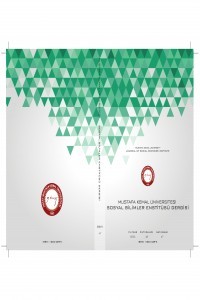Öğrencilerin Derslerde Teknoloji Ürünü Kullanımına Yönelik Tutumu: Bir Ölçek Geliştirme Çalışması/Students' Attitudes towards Technology Use in the Lessons: A Scale Development Study
Teknoloji, Öğrenci, Tutum Ölçeği
-
Technology, Student, Attitude Scale,
___
- Akçay, H., Tüysüz, C. ve Feyzioğlu, B. (2003). “Bilgisayar Destekli Fen Bilgisi Öğretiminin Öğrenci Başarısına ve Tutumuna Etkisine Bir Örnek: Mol Kavramı ve Avogadro Sayısı”. The Turkish Online Journal of Educational Technology (TOJET), 2, 2(9), 57-66.
- Altunışık, R., Coşkun, R., Bayraktaroğlu, S. ve Yıldırım, E. (2005). Sosyal bilimlerde araştırma yöntemleri: SPSS uygulamalı. Sakarya: Sakarya Üniversitesi İİBF.
- Asan, A. ve Haliloğlu, Z. (2005). “Implementing Project Based Learning In Computer Classroom”. TOJET, Volume 4, 3(10), 68-81.
- Bilgin, İ., Özarslan, M., ve Bahar, M.(2006). “İlköğretim 8. Sınıf Alan Bağımlı ve Bağımsız Bilişsel Stile Sahip Öğrencilerin Fen Dersine Karşı Tutum ve Maddenin Doğası Konusundaki Başarılarının Karşılaştırılması“, VII. Ulusal Fen Bilimleri ve Matematik Eğitimi Kongresi, Ankara.
- Büyüköztürk, Ş. (2008). Veri Analizi El Kitabı, İstatistik, Araştırma Deseni SPSS Uygulamaları ve Yorum, (9. Baskı), Pegem-Akademi.
- Chang, C. Y. (2002). “Does Computer-Assisted İnstruction + Problem Solving =İmproved Science Outcomes? A Pioneer Study”. The Journal of Educational Research, 95 (3):143-150.
- Ekici, G. (2002). “Biyoloji Öğretmenlerinin Laboratuar Dersine Yönelik Tutum Ölçeği (BÖLDYTÖ).” Hacettepe Üniversitesi Eğitim Fakültesi Dergisi, (22), 62-66.
- Hacker, R.G. ve Sova, B.(1998). “Initial teacher education: a study of the efficacy of computer mediated courseware delivery in a partnership concept.” British Journal of Education Technology, 29 (4):333-341.
- Kalaycı, S. (2005). SPSS Uygulamalı Çok Değişkenli İstatistik Teknikleri. Ankara: Asil Yayın Dağıtım.
- Kan, A. ve Akbaş, A.(2005).“Lise Öğrencilerinin Kimya Dersine Yönelik Tutum Ölçeği Geliştirme Çalışması”, Mersin Üniversitesi Eğitim Fakültesi Dergisi, Mersin.
- Kaptan, F. (2001). Fen Bilgisi Öğretimi. İstanbul: Milli Eğitim Basımevi.
- Kenar, İ. (2010). “Mikro BTDFDS Bilgisayar Teknolojileri Fen Deney Setinin Okullarımızda Uygulanabilirliği Ve Öğreticilik Performansının İncelenmesi”. Türk Fizik Derneği 27. Uluslararası Fizik Kongresi, İstanbul-TÜRKİYE.
- Kind, P., James, K. ve Barmby, P.(2007). “Developing attitudes towards science measures”, Internatial Journal of Science Education, 29 (7): 871-893.
- Koballa, T.R. (1988). “Attitude and related concepts in science education”. Science Education, 72, 115-126.
- Özmen, H. ve Kolomuç, A. (2004). “Bilgisayarlı Öğretimin Çözeltiler Konusundaki Öğrenci Başarısına Etkisi”. Gazi Üniversitesi Kastamonu Eğitim Dergisi, 12(1), 57-68.
- Morgan, C.T. (1991). Psikolojiye Giriş (Çev. Arıcı, H., Aydın, O. ve ark.), Ankara, Hacettepe Üniversitesi Psikoloji Bölümü Yayınları.
- Nuhoğlu, H. ve Yalçın, N. (2004). “Fizik Laboratuvarına Yönelik Bir Tutum Ölçeğinin Geliştirilmesi ve Öğretmen Adaylarının Fizik Laboratuvarına Yönelik Tutumlarının Değerlendirilmesi” Gazi Üniversitesi Kırşehir Eğitim Fakültesi Dergisi (KEFAD), 5(2), 317-327.
- Nuhoğlu, H. (2008). “The Development of an Attitude Scale for Science and Technology Course”, İlköğretim Online, 7(3), 627-639, [Online]: http://ilkogretim-online.org.tr.
- Pell, T. ve Jarvis, T. (2001). “Developing Attitude to Science Scales for Use with Children of Ages From 5 to 11”, International Journal of Science Education, 23 (8): 847-862.
- Reid, N. ve Skryabina, E. A.(2002). ”Attitudes Toward Physics”, Research in Science and Technology Education, 20 (1), 67-81.
- Shrigley, R.L., Koballa, T. R., & Simpson, R. D. (1988). “Defining attitudes for science educators”. Journal of Research in Science Teaching, 25(8), 659-678.
- Sünbül, A. M. (2004). “Düşünce Stilleri Ölçeğinin Geçerlilik ve Güvenirliliği”. Eğitim ve Bilim, 29(132), 25-42.
- Şimşek, N.(2002). Kimya Eğitimine Yönelik Bir Tutum Ölçeği Hazırlanması ve Buna Yönelik Çeşitli Değerlendirmelerin Yapılması, Hacettepe Üniversitesi Fen Bilimleri Enstitüsü Yüksek Lisans Tezi, Ankara.
- Tavşancıl, E.(2006). Tutumların Ölçülmesi ve SPSS ile Veri Analizi. Ankara: Nobel Yayın Dağıtım.
- Tezbaşaran, A. (1996). Likert Tipi Ölçek Geliştirme Kılavuzu. Ankara: Türk Psikologlar Derneği Yayınları.
- Turgut, F. (1983). Eğitimde Ölçme ve Değerlendirme Metotları. Ankara: Saydam Matbaacılık.
- Turgut, F. ve Baykul, Y. (1992). Ölçekleme Teknikleri. Ankara: ÖSYM Yayınları.
- Ülgen, G. (1996). Eğitim Psikolojisi, Lazer Ofset, Ankara
- Yalçınalp, S. Geban Ö. ve Özkan, I. (1995). “Effectiveness of using computer-assisted supplementary instruction for teaching the mole concept”. Journal of Research in Science Teaching, 32, 1083-1095.
- Yaman, M. (2007). “The Competence of Physical Education Teachers In Computer Use”. TOJET, 6, 4(5), 46-55.
- Yenice, N. (2003). “Bilgisayar Destekli Fen Bilgisi Öğretiminin Öğrencilerin Fen ve Bilgisayar Tutumlarına Etkisi”. TOJET, 2, 4(12), 79- 85.
- Başlangıç: 2004
- Yayıncı: Hatay Mustafa Kemal Üniversitesi
Celalettin Korkmaz, Münir Şahin
Aysel TEMELLİ, Murat Kurt, İbrahim Gümüş, Aysel Temelli
ÖĞRETMEN ADAYLARINDA ATILGANLIK DÜZEYİ VE İLETİŞİM BECERİLERİ
Hadiye Küçükkaragöz, Tuncay Canbulat, Yasin Akay
KENT KONSEYLERİNİN SORUNLARI ÜZERİNE BİR İNCELEME: ÇANAKKALE KENT KONSEYİ ÖRNEĞİ
